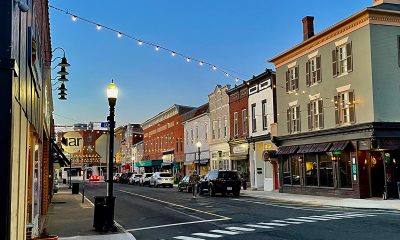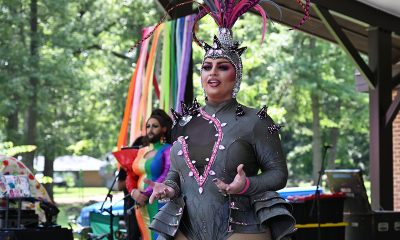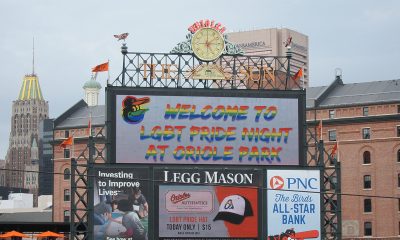Arts & Entertainment
The power of two
Brother/sister duo K’s Choice reunite for U.S. tour
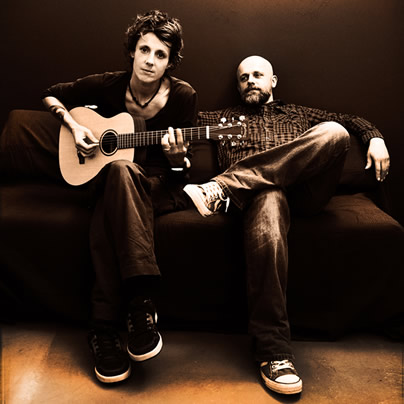
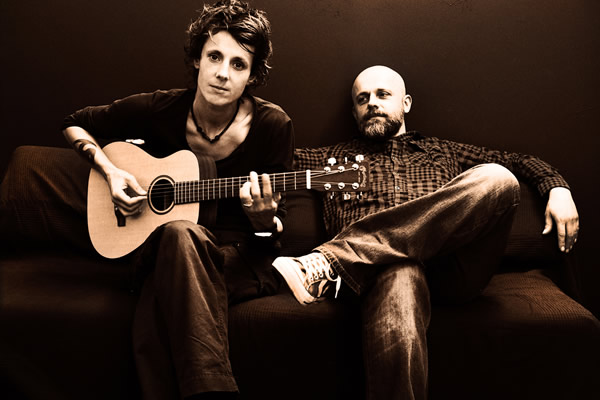
K’s Choice — brother-sister duo Sarah and Gert Bettens — are back with their first album in eight years. (Photo by Frank Clauwers; courtesy Think Press)
K’s Choice
With A Fragile Tomorrow
Wednesday
8 p.m.
$20
Ram’s Head on Stage
33 West St.
Annapolis, Md.
Ramsheadonstage.com
It’s an exciting time for K’s Choice fans. The brother/sister alt rock band that came to international fame in the ‘90s with hits like “Not an Addict,” “Believe” and “Almost Happy” while touring with Alanis Morissette and the Indigo Girls, are back with the U.S. release of their first album in a decade, “Echo Mountain.”
Though released abroad in 2010, “Mountain” and its acoustic companion “Little Echoes” are available stateside this month to coincide with a U.S. tour that kicks off next week in Tennessee. On Tuesday they play Ram’s Head Live in Annapolis.
During an interview last week, Sarah Bettens, who co-fronts the native Belgian band with her brother Gert, spoke to the Blade from her home in Johnson City, Tenn., (about four hours from Nashville) where she moved to be with her partner 10 years ago about the time K’s Choice opted for a long hiatus.
“It’s near the North Carolina/Virginia border,” she says, admitting it’s a much different place to live than her native Belgium where most of her family still resides “within about a 15-mile radius.”
“Yes, it is a lot different, but that being said, it has changed a lot in the last 10 years. There was just an article in the local newspaper about two guys looking to adopt. It was on the front page and I remember thinking, ‘Ten years ago, this would never have been in the local newspaper.’ Some, I’m sure, were offended by it, but more and more, they’re in the minority. People seem to care less and less. … It was an adjustment at first, but everywhere you go, you’re able to find like-minded people. We have good friends here and we’re happy.”
Of the four kids Bettens and her partner are raising, she says they’re, “actually very respectful” of her music.
“It’s always a bit of a surprise that they’re respectful about anything at that age, but when I play locally, which is only maybe once every two years, they come and feel proud.”
Sarah and Gert have one older brother. She says he’s “a music lover, but not musically inclined.” She says he’s always been supportive of K’s Choice, whose hiatus, she says, was “a very conscious thing.”
In the time between the last K’s Choice album, “Almost Happy,” in 2000, Bettens, 40, has released three solo albums and an EP and has also contributed her husky, haunting vocals to several movie soundtracks. Gert, 43, also did solo work in the meantime.
“We always said one day we’d get back together when we were ready and we knew it would be great fun, but we also considered the hiatus a true hiatus,” she says. “We needed to work with some other people, do some other things. We’d never really worked with anybody else because we’d kind of grown up in our own band so that kinda kept us from experiences with other musicians. That just had always been the way it was right from the beginning, so it was healthy and fun for us to go our own ways for awhile.”
Bettens’ U.S. residency did make for a few slight challenges when it came time to reunite for “Echo Mountain,” which has earned strong reviews with All Music Guide calling it a “simple but mature and filler-free alt-rock album” that’s more “nostalgic” and “downright fun” than “angsty.”
“For a long time, I would only see him when I was doing my solo tours,” she says. “We sent some MP3s back and forth but eventually we did have to sit down in the same room and decide what kind of record we wanted to make. It was very hard to get direction until we did that.”
Bettens says there’s not ordinarily a huge distinction between the songs she writes for her solo projects and K’s Choice material though the material for her first solo album — around the time she came out as a lesbian in the early ‘00s — was more personal than K’s Choice material had typically been.
She came out to her family “as soon as I was out to myself,” but waited to come out publicly.
“I didn’t wait around with a big secret for years and years,” she says. “I just kind of discovered it myself, for some reason I haven’t fully figured out yet, at a very late age. I was 28. Looking back, I really wonder why I didn’t see the 25,000 signs there were from the age of 5. But for some reason it took me til age 28 to fully figure it out. I didn’t come out to the rest of the world right away, not because I was scared of some backlash, but I knew I would quickly become some sort of spokesperson and I really felt I had nothing much to say about it yet. It was all so new to me that I didn’t want to have to speak for the gay community. I didn’t think I had anything interesting to share.”
Being outed in a magazine shortly thereafter was “fine,” she says.
“It was probably supposed to happen that way,” she says. “It was good to show young people that lesbians are normal people too.”
SIDEBAR:
5 quick music questions with Sarah Bettens
WASHINGTON BLADE: Alt rock lyrics, especially in the ‘90s, are known to be sort of vague and oblique. Do you think about how direct you’re being when writing lyrics?
SARAH BETTENS: No, I don’t give it any thought when I’m writing. Afterwards, my brother and I laugh about how different our lyrics are. It’s a much more roundabout trip to get to the bottom of his lyrics I think.
BLADE: Your pitch always seems so dead on. When you’ve been singing professionally for many years, does that eventually become something that happens naturally or are you always thinking on some level about whether your pitch is right?
BETTENS: Sometimes when we listen back to, say, a three-part harmony, we will notice things like places where we tend to go a little flat every time so we know to watch out for it. Sometimes you listen back to a recording of a live show where you think you did a fantastic job and it’s a little disappointing because it always sounds more perfect the way you remember it in your head, which isn’t always the reality. And we do notice things in rehearsal, like, “OK, we tend to go flat here, we need to be careful of that.” I find simply looking up in those passages is helpful for tone.
BLADE: Having started your career before the Internet became really widespread, all things considered, has it been more of a blessing or curse for your music career?
BETTENS: There are obvious downsides. Everybody has lost money and record companies have gotten smaller and really struggled. We started right before that when everybody still had money so Sony was giving us big dinners and there was lots of money to record, a big budget for touring. That’s unheard of anymore. When we toured with Alanis, Sony gave us a tour bus, money to pay our musicians. Stuff like that today, at least on our level, is unheard of. … And it’s getting very hard for a band like us to get on the radio but even so, no matter how small you are or how dire the outlook, there’s always the chance that something will get discovered on the Internet. There’s always that hope. So to say it’s been a totally negative thing would be exaggerating. But for sure, we’ve lost money by not selling records. We’ll play some crazy sold out show in someplace like Israel where we’ve never been before and people will be singing along to every word and we know we haven’t even sold 2,000 albums altogether in Israel so you think, “How do they know all these songs so well?” It makes for pleasant surprises but it’s also a little disturbing too.

The fifth annual Fredericksburg Pride march and festival was held on Saturday, June 28. A march through the streets of downtown Fredericksburg, Va. was followed by a festival at Riverfront Park.
(Washington Blade photos by Michael Key)



















India
Anaya Bangar challenges ban on trans women in female cricket teams
Former Indian cricketer Sanjay Bangar’s daughter has received support

Anaya Bangar, the daughter of former Indian cricketer Sanjay Bangar, has partnered with the Manchester Metropolitan University Institute of Sport in the U.K. to assess her physiological profile following her gender-affirming surgery and undergoing hormone replacement therapy.
From January to March 2025, the 23-year-old underwent an eight-week research project that measured her glucose levels, oxygen uptake, muscle mass, strength, and endurance after extensive training.
The results, shared via Instagram, revealed her metrics align with those of cisgender female athletes, positioning her as eligible for women’s cricket under current scientific standards. Bangar’s findings challenge the International Cricket Council’s 2023 ban on transgender athletes in women’s cricket, prompting her to call for a science-based dialogue with the Board of Control for Cricket in India and the ICC to reform policies for transgender inclusion.
“I am talking with scientific evidence in my hand,” Bangar said in an interview posted to her Instagram page. “So, I hope, this makes an impact and I will be hoping to BCCI and ICC talking with me and discussing this further.”
On Nov. 21, 2023, the ICC enacted a controversial policy barring trans women from international women’s cricket. Finalized after a board meeting in Ahmedabad, India, the regulation prohibits any trans player who has experienced male puberty from competing, irrespective of gender-affirming surgery or hormone therapy. Developed through a 9-month consultation led by the ICC’s Medical Advisory Committee, the rule aims to safeguard the “integrity, safety, and fairness” of women’s cricket but has drawn criticism for excluding athletes like Canada’s Danielle McGahey, the first trans woman to play internationally. The policy, which allows domestic boards to set their own rules, is slated for review by November 2025.
Bangar shared a document on social media verifying her participation in a physiological study at the Manchester Metropolitan University Institute of Sport, conducted from Jan. 20 to March 3, 2025, focused on cricket performance. The report confirmed that her vital metrics — including haemoglobin, blood glucose, peak power, and mean power — aligned with those of cisgender female athletes. Initially, her fasting blood glucose measured 6.1 mmol/L, slightly above the typical non-diabetic range of 4.0–5.9 mmol/L, but subsequent tests showed it normalized, reinforcing the study’s findings that her physical profile meets female athletic standards.
“I am submitting this to the BCCI and ICC, with full transparency and hope,” said Bangar. “My only intention is to start a conversation based on facts not fear. To build space, not divide it.”
In a letter to the BCCI and the ICC, Bangar emphasized her test results from the Manchester Metropolitan University study. She explained that the research aimed to assess how hormone therapy had influenced her strength, stamina, haemoglobin, glucose levels, and overall performance, benchmarked directly against cisgender female athletic standards.
Bangar’s letter to the BCCI and the ICC clarified the Manchester study was not intended as a political statement but as a catalyst for a science-driven dialogue on fairness and inclusion in cricket. She emphasized the importance of prioritizing empirical data over assumptions to shape equitable policies for trans athletes in the sport.
Bangar urged the BCCI, the world’s most influential cricket authority, to initiate a formal dialogue on trans women’s inclusion in women’s cricket, rooted in medical science, performance metrics, and ethical fairness. She called for the exploration of eligibility pathways based on sport-specific criteria, such as haemoglobin thresholds, testosterone suppression timelines, and standardized performance testing. Additionally, she advocated for collaboration with experts, athletes, and legal advisors to develop policies that balance inclusivity with competitive integrity.
“I am releasing my report and story publicly not for sympathy, but for truth. Because inclusion does not mean ignoring fairness, it means measuring it, transparently and responsibly,” said Bangar in a letter to the BCCI. “I would deeply appreciate the opportunity to meet with you or a representative of the BCCI or ICC to present my findings, discuss possible policy pathways, and work towards a future where every athlete is evaluated based on real data, not outdated perceptions.”
Before her transition, Bangar competed for Islam Gymkhana in Mumbai and Hinckley Cricket Club in the U.K., showcasing her talent in domestic cricket circuits. Her father, Sanjay Bangar, was a dependable all-rounder for the Indian national cricket team from 2001 to 2004, playing 12 test matches and 15 One Day Internationals. He later served as a batting coach for the Indian team from 2014 to 2019, contributing to its strategic development.
Cricket in India is a cultural phenomenon, commanding a fanbase of more than 1 billion, with more than 80 percent of global cricket viewership originating from the country.
The International Cricket Council, the sport’s governing body, oversees 12 full member nations and more than 90 associate members, with the U.S. recently gaining associate member status in 2019 and co-hosting the 2024 ICC Men’s T20 World Cup. The BCCI generated approximately $2.25 billion in revenue in the 2023–24 financial year, primarily from the Indian Premier League, bilateral series, and ICC revenue sharing. The ICC earns over $3 billion from media rights in India alone for the 2024–27 cycle, contributing nearly 90 percent of its global media rights revenue, with the BCCI receiving 38.5 percent of the ICC’s annual earnings, approximately $231 million per year.
Women’s cricket in India enjoys a growing fanbase, with over 300 million viewers for the Women’s Premier League in 2024, making it a significant driver of the sport’s global popularity. The International Cricket Council oversees women’s cricket in 12 full member nations and over 90 associate members, with the U.S. fielding a women’s team since gaining associate status in 2019 and competing in ICC events like the 2024 Women’s T20 World Cup qualifiers. The BCCI invests heavily in women’s cricket, allocating approximately $60 million annually to the WPL and domestic programs in 2024–25, while contributing to the ICC’s $20 million budget for women’s cricket development globally. India’s media market for women’s cricket, including WPL broadcasting rights, generated $120 million in 2024, accounting for over 50 percent of the ICC’s women’s cricket media revenue.
“As a woman, I feel when someone says that they are women, then they are, be trans or cis. A trans woman is definitely the same as a cis woman emotionally and in vitals, and specially, when someone is on hormone replacement therapy. Stopping Anaya Bangar from playing is discrimination and violation of her rights. It is really sad and painful that every transwoman need to fight and prove their identity everywhere,” said Indrani Chakraborty, an LGBTQ rights activist and a mother of a trans woman. “If ICC and BCCI is stopping her from playing for being transgender, then I will say this to be their lack of awareness and of course the social mindsets which deny acceptance.”
Chakraborty told the Blade that Bangar is an asset, no matter what. She said that the women’s cricket team will only benefit by participation, but the discriminating policies are the hindrance.
“Actually the transgender community face such discrimination in every sphere. In spite of being potent, they face rejection. This is highly inhuman. These attitudes is regressive and will never let to prosper. Are we really in 2025?,” said Chakraborty. “We, our mindset and the society are the issues. We, as a whole, need to get aware and have to come together for getting justice for Anaya. If today, we remain silent, the entire community will be oppressed. Proper knowledge of gender issues need to be understood.”
The BCCI and the International Cricket Council have not responded to the Blade’s repeated requests for comment.
Theater
‘Andy Warhol in Iran’ a charming look at intersection of art, politics
Mosaic production plumbs kidnapping plot of iconic artist for humor

‘Andy Warhol in Iran’
Through July 6
Mosaic Theater Company at Atlas Performing Arts Center
1333 H St., N.E., WDC
$70
Mosaictheater.org
Behind the blasé veneer, Andy Warhol was more curious than people knew. Particularly when it came to money. He kept a close eye on how the ultra-rich lived, what fellow artists were being paid and who was paying them, and, of course, all the new and more saleable ways of making and selling art.
In playwright Brent Askari’s “Andy Warhol in Iran,” now playing at Mosaic Theater Company, Warhol (Alex Mills) is brought outside of his usual area of interest when he lands face to face with a young revolutionary. While Warhol could be artistically revolutionary, he didn’t connect with the idea of forgoing the pursuit of money and fame for the infinitely more difficult task of achieving social justice.
The 90-minute play is not fully factual, but rather inspired by Warhol’s real life 1976 trip to Tehran to make portraits of the royal Pahlavi family in the waning days of their reign, with a focus on Farah Diba, the Shah’s elegant wife and Iran’s last empress.
The action unfolds in a Tehran hotel suite boasting a glorious view of the snowcapped Alborz Mountains not far from Iran’s vibrant and bustling capital. It’s here, disguised as room service, that Farhad (played by Nathan Mohebbi) gains entrance to Warhol’s rooms, seeking to kidnap the pop art star to garner attention for the university students’ movement.
Warhol meets the armed intruder with a sort of wide-eyed wonderment, flummoxed why he has been selected for abduction. Warhol can’t understand why a young man like Farhad wouldn’t prefer to be paid a big ransom on the spot, or be cast as a star in one of the Warhol Factory flicks.
When Farhad replies it’s because Warhol is the most decadent artist in the world, Warhol mistakenly takes it for the ultimate compliment. After all, his biggest successes had been connected to celebrity and consumerism (think Campbell’s Soup Cans. 1962).
For Warhol, decadence is aspirational. He made portraits of financiers, movie stars, and jet setters. In fact, he’d been obsessed with the lives of the rich and famous since he was a small kid in Pittsburgh thumbing through Photoplay Magazine while bed bound with Saint Vitus Dance.
Accompanying Warhol to Tehran (unseen) are his business manager Fred Hughes, and Bob Colacello, editor of Interview magazine. Together, they make a merry trio of gay social climbers. These kinds of trips were a boon to the artist. Not only did they solidify a new strata of high society contacts, but were also superbly lucrative, thickly padding the painter’s pockets.
While in Iran, Warhol wanted only to view Farah’s vast world-class collection of jewels, sample the caviar on tap, and get his Polaroids. Then he’d fly first class back to New York and transfer the images to silk screen and sell the portraits to the Persian royals at a hefty price. He didn’t foresee any obstacles along the way.
Serge Seiden’s direction is spot on. He’s rendered a wonderfully even two-hander with a pair of terrifically cast actors. And Seiden plumbs the piece for humor mostly drawn from the absurdity of the situation without missing any of the serious bits.
As Warhol, out actor Mills is instantly recognizable as the eccentric artist. He’s wearing the button-down shirt, jeans, blazer, glasses, and, of course the famed shock of white hair wig (here a little more Karen than Andy). His portrayal is better than an imitation. He gives a bit of the fey and confused, but has also infuses him with a certain dynamism.
The energy works well with the intensity of Mohebbi’s would-be kidnapper Farhad. And while it isn’t a romance, it’s not impossible to think that Warhol might fall for a handsome male captor.
The connection between art and politics is almost always interesting; and though not a super deep dive into the era or the life of an artist, “Andy Warhol in Iran” is a compelling, charming, and sometimes funny glimpse into that intersection.
-

 U.S. Supreme Court3 days ago
U.S. Supreme Court3 days agoSupreme Court upholds ACA rule that makes PrEP, other preventative care free
-

 U.S. Supreme Court4 days ago
U.S. Supreme Court4 days agoSupreme Court rules parents must have option to opt children out of LGBTQ-specific lessons
-

 National5 days ago
National5 days agoEvan Wolfson on the 10-year legacy of marriage equality
-

 Congress4 days ago
Congress4 days agoSenate parliamentarian orders removal of gender-affirming care ban from GOP reconciliation bill

